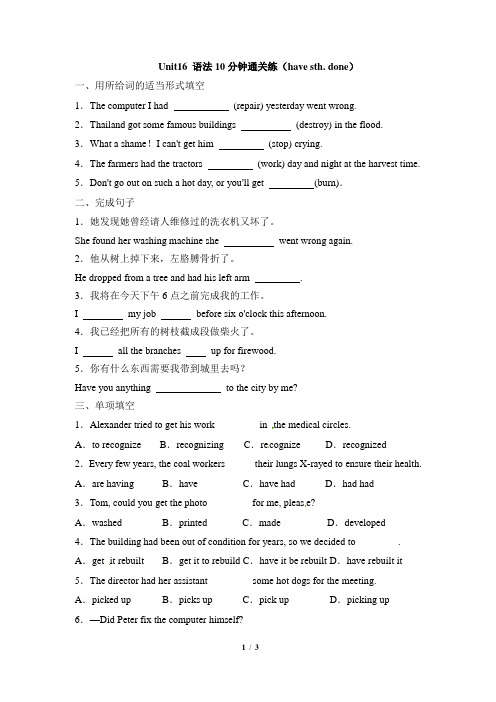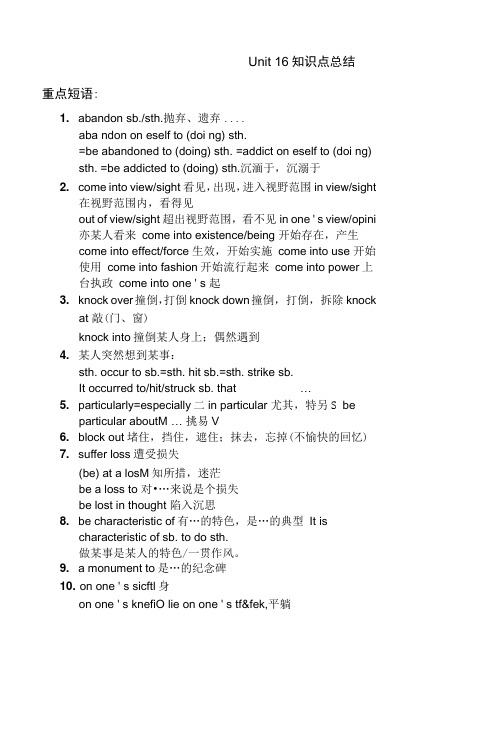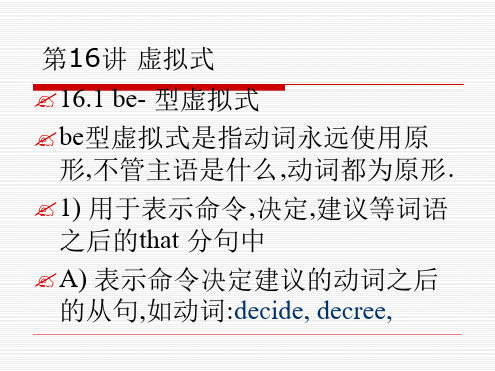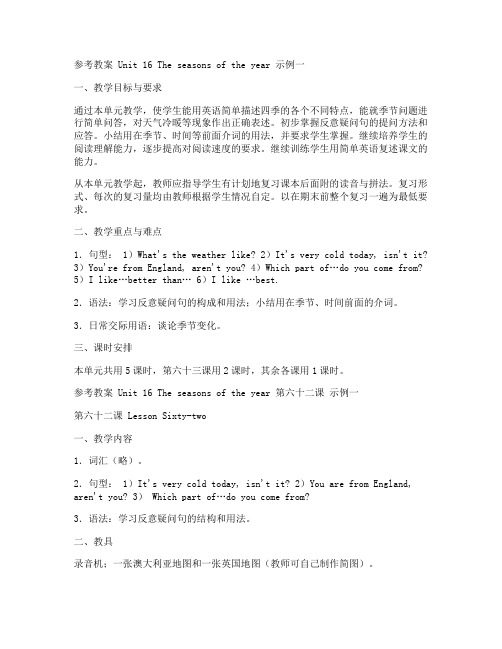英语语法(Unit16)
英语九年级上册16课笔记

英语九年级上册16课笔记u n i t1【重点短语】1. have conversation with sb. 同某人谈话2. too…to…太……而不能3. the secret to………的秘诀4. be afraid of doing sth./ be afraid to do sth. 害怕做某事5. look up 查阅6. repeat out loud 大声跟读7. make mistakes in 在……方面犯错误8. connect ……with…把……和……连接/联系起来9. get bored 感到厌烦10. be stressed out 焦虑不安的11. pay attention to 注意;关注12. depend on 取决于;依靠13. the ability to do sth.. 做某事的能力u n i t2【短语归纳】1. the Lantern Festival 元宵节2. the Dragon Boat Festival 端午节3. the Water Festival 泼水节4. be fun to watch 看着很有意思5. eat five meals a day 一天吃五餐6. put on five pounds 体重增加了五磅7. in two weeks 两星期之后8. be similar to... 与.......相似17. end up最终成为;最后处于18. share sth. with sb. 与……分享……19. as a result 结果20. dress up 乔装打扮21. haunted house 鬼屋22. call out 大声呼喊23. remind sb. of 使某人想起24. sound like 听起来像25. treat sb. with. 用/以……对待某人26. the beginning of new life 新生命的开始u n i t3【短语归纳】1. used to do sth. 过去常常做某事2. be afraid of 害怕3. from time to time 时常;有时4. turn red 变红5. take up 开始做,从事,占据(时间、空间)6. deal with 对付;应付7. not…any more 不再8. tons of attention 很多关注9. worry about 担心10. be careful 当心11. hang out 闲逛12. give up 放弃13. thank about 考虑14. a very small number of…极少数的……15. be alone 独处16. give a speech 做演讲u n i t3【短语归纳】1. used to do sth. 过去常常做某事2. be afraid of 害怕3. from time to time 时常;有时4. turn red 变红5. take up 开始做,从事,占据(时间、空间)6. deal with 对付;应付7. not…any more 不再8. tons of attention 很多关注9. worry about 担心10. be careful 当心11. hang out 闲逛12. give up 放弃13. thank about 考虑14. a very small number of…极少数的……15. be alone 独处16. give a speech 做演讲u n i t4【重点短语】1. be more interested in 对…更感兴趣2. on the swim team 游泳队的队员3. be terrified of 害怕4. gym class 体操课5. worry about 担心6. all the time 一直,总是7. chat with 与…闲聊8. hardly ever 几乎从不9. walk to school = go to school on foot 步行去上学take the bus to school = go to school by bus 乘车去上学10. as well as 不仅…而且...u n i t5【重点短语】1. be made of 由……制造2. be made in 在……制造3. environmental protection 环境保护4. be famous for 以……而著名5. be produced in 在……生产6. be known for 以……闻名7. as far as I know 据我所知8. pick by hand 手工采摘9. send for 发送10. avoid doing sth 避免做某事11. everyday things 日用品。
北师大版高二英语必修6_Unit16_语法10分钟通关练(have_sth.done)

Unit16 语法10分钟通关练(have sth. done)一、用所给词的适当形式填空1.The computer I had (repair) yesterday went wrong.2.Thailand got some famous buildings (destroy) in the flood. 3.What a shame!I can't get him (stop) crying.4.The farmers had the tractors (work) day and night at the harvest time. 5.Don't go out on such a hot day, or you'll get (burn).二、完成句子1.她发现她曾经请人维修过的洗衣机又坏了。
She found her washing machine she went wrong again.2.他从树上掉下来,左胳膊骨折了。
He dropped from a tree and had his left arm .3.我将在今天下午6点之前完成我的工作。
I my job before six o'clock this afternoon.4.我已经把所有的树枝截成段做柴火了。
I all the branches up for firewood.5.你有什么东西需要我带到城里去吗?Have you anything to the city by me?三、单项填空1.Alexander tried to get his work ________ in the medical circles.A.to recognize B.recognizing C.recognize D.recognized 2.Every few years, the coal workers _____ their lungs X-rayed to ensure their health. A.are having B.have C.have had D.had had 3.Tom, could you get the photo ________ for me, pleas e?A.washed B.printed C.made D.developed 4.The building had been out of condition for years, so we decided to ________. A.get it rebuilt B.get it to rebuild C.have it be rebuilt D.have rebuilt it 5.The director had her assistant ________ some hot dogs for the meeting. A.picked up B.picks up C.pick up D.picking up 6.—Did Peter fix the computer himself?1/ 3—He ________,because he doesn't know much about computers.A.has it fixed B.had fixed it C.had it fixe d D.fixed it 7.There is something wrong with the brake of my new car, and I'll have to have it ________.A.to check B.checked C.to be checked D.being checked 8.Tom knew he would certainly get ________ if he was late home.A.shout at B.to shout at C.shouted at D.to be shouted at2/ 3参考答案一、1.repaired2.destroyed3.to stop4.working5.burnt二、1.had had/got repaired2.broken5.to be taken4.have had/got;cut3.will have/get;finished三、1.选D。
北师大版unit16知识点总结

Unit 16知识点总结重点短语:1. abandon sb./sth.抛弃、遗弃....aba ndon on eself to (doi ng) sth.=be abandoned to (doing) sth. =addict on eself to (doi ng)sth. =be addicted to (doing) sth.沉湎于,沉溺于2. come into view/sight看见,出现,进入视野范围in view/sight在视野范围内,看得见out of view/sight超出视野范围,看不见in one ' s view/opini亦某人看来come into existence/being 开始存在,产生come into effect/force 生效,开始实施come into use 开始使用come into fashion开始流行起来come into power上台执政come into one ' s 起3. knock over撞倒,打倒knock down撞倒,打倒,拆除knockat 敲(门、窗)knock into撞倒某人身上;偶然遇到4. 某人突然想到某事:sth. occur to sb.=sth. hit sb.=sth. strike sb.It occurred to/hit/struck sb. that …5. particularly=especially二in particular 尤其,特另S beparticular aboutM … 挑易V6. block out堵住,挡住,遮住;抹去,忘掉(不愉快的回忆)7. suffer loss遭受损失(be) at a losM知所措,迷茫be a loss to 对•…来说是个损失be lost in thought 陷入沉思8. be characteristic of有…的特色,是…的典型It ischaracteristic of sb. to do sth.做某事是某人的特色/一贯作风。
人教版高三Unit16语言点讲解

人教版高三 Unit 16 语言点讲解Unit 16 Finding jobs1. take off 起飞;脱下,摘下,迅速流行,换下,终止,取消;休假,休息,剪掉,切除(人体);模仿The plane took off an hour late. 飞机起飞晚了一小时。
Her singing career took off after her TV appearance. 她在电视上亮相后歌唱事业迅速起飞。
I’ve decided to take a few days off next week. 我已经决定下周休息几天。
The show was taken off because of poor audience figures. 该剧因不卖座而停演了。
2. accomplish 完成,达到,实现accomplish finish, complete 区别1) accomplish经常接task, aim, journey, voyage 等名词。
如:The explorers accomplished the voyage in five weeks. 探险队在五周内完成了航程。
The first part of the plan has been safely accomplished. 计划的第一部分已顺利完成。
2) complete比accomplish具体,可接简化组,工程,书籍等名词。
指“按预期目的把未完成的工作经进一步的努力使之完成”,主要涵义是“补足缺少的部分”。
如:The building will be completed by the end of this month. 这座楼将于本月底完成。
3) finish 在许多情况下可与complete 换用,但不及complete 正式。
常含有“认真仔细地完成工作的最后阶段的精工修饰,使之完美”的意思。
如I have to finish writing the book by this weekend. 我得在本周末写完这本书。
九年级英语Unit 16 The football match人教朗文版知识精讲

九年级英语Unit 16 The football match人教朗文版【本讲教育信息】一. 教学内容:Unit 16 The football matchI. 词汇:beat, goal, check-out, realize, train, training, captain, deserve, confident, striker, midfield, excellent, shot, nervous, lazy, final, amazing, performance, teamwork, basketball, boring, spill, rule against, expect, roughII. 词组:by the time 到…的时候midfield player中场球员carry on 坚持下去,继续下去be pleased with 对…感到满意never mind 没有关系from now on 从现在起,今后think of 认为by the time 到…时候receive a letter from 收到…的来信play against 与…比赛expect to do …期望、预计be against 与…对抗III. 交际用语:I have never seen such an exciting match before.They beat us 5-3The boys are too confident.Never mind.It’s a boring. / gr eat match!It was the happiest day of my life.IV. 语法:过去完成时二. 重点、难点:1. beat sb (in, at)sth.He beat me at chess.I can beat you at swimming注win后接game, war, match, competion等We won the match easily2. He said he had seen him.过去完成时态:表示一个动作发生在过去某一时间之前或某一动作之前,即过去的过去。
新编英语语法教程第16讲

? 4. 董事会决定任命约翰逊为总经理 . ? A:The board decided that Johnson be appointed
general manager.
? 5. 如果我是你,我会勇敢地正视这一问题 .
? A: If I were you, I would face up to the problem.
? 6. 假如我身体好一些 ,我早就离开这里了 . ? A:
If I were in better health, I would have long left this place.
? 7. 我非常不愿意眼看他犯错误 .
? A: Far be it from me to see him make a mistake.
?C) 用在一些形容词后的真实主语 从句中.如形容词:advisable, appropriate, desirable, essential, fitting, imperative, important, impossible, necessary, obligatory, proper等.
?It is essential that all the facts be examined first.
you took a rest. ?It's high time we left this place.
?B) I would rather/ sooner that… ?I would rather she got home a little
earlier. ?I'd rather he told me the truth. ?I would rather he had been present. ?C) If only… ?If only I knew her address.
新概念英语第2册:第16课重要句型语法

第16课的内容: ⼀、重要句型或语法 1、if条件句 在第⼀册第137-138课⾥已经学过了if引导的条件状语从句,当时侧重的是“主将从现”的原则的运⽤。
本课的if条件句在“从现”的基础上,⼜增加了从句使⽤其他时态的情况,如:现在进⾏时(If he is working, I won't disturb him.)。
此外,还出现了与情态动词连⽤的情况,如:He will come tomorrow if he can. ⼆、课⽂主要语⾔点 If you park your car in the wrong place, a traffic policeman will soon find it. 1)注意park(熄⽕停车)和stop(临时停车)的区别。
2)wrong,错误的。
与right相反。
3)注意交警的表达:traffic policeman。
4)句中的it指的是前半句中所说的“车⼦停错位置”。
You will be very lucky if he lets you go without a ticket. 1)let sb. go,放过某⼈。
2)ticket,罚款单。
However, this does not always happen. 这句话要注意联系前后⽂来理解,本句所说的这种情况(this)不常发⽣,指的是交警不总是很严厉。
本句话可以作为套话来⽤,表达某种情况不常发⽣时⽤。
Traffic police are sometimes very polite. 1)police是警察的总称,⽤作复数。
2)本句话就验证了前⼀句话暗含的意思,即交警有时也很客⽓。
During a holiday in Sweden, I found this note on my car: "Sir, we welcome you to our city. This is a 'No Parking' area. You will enjoy your stay here if you pay attention to our street signs. This note is only a reminder." 1)note,便条。
Unit 16 The seasons of the year

参考教案 Unit 16 The seasons of the year 示例一一、教学目标与要求通过本单元教学,使学生能用英语简单描述四季的各个不同特点,能就季节问题进行简单问答,对天气冷暖等现象作出正确表述。
初步掌握反意疑问句的提问方法和应答。
小结用在季节、时间等前面介词的用法,并要求学生掌握。
继续培养学生的阅读理解能力,逐步提高对阅读速度的要求。
继续训练学生用简单英语复述课文的能力。
从本单元教学起,教师应指导学生有计划地复习课本后面附的读音与拼法。
复习形式、每次的复习量均由教师根据学生情况自定。
以在期末前整个复习一遍为最低要求。
二、教学重点与难点1.句型: 1)What's the weather like? 2)It's very cold today, isn't it? 3)You're from England, aren't you? 4)Which part of…do you come from? 5)I like…better than… 6)I like …best.2.语法:学习反意疑问句的构成和用法;小结用在季节、时间前面的介词。
3.日常交际用语:谈论季节变化。
三、课时安排本单元共用5课时,第六十三课用2课时,其余各课用1课时。
参考教案 Unit 16 The seasons of the year 第六十二课示例一第六十二课 Lesson Sixty-two一、教学内容1.词汇(略)。
2.句型: 1)It's very cold today, isn't it? 2)You are from England, aren't you? 3)Which part of…do you come from?3.语法:学习反意疑问句的结构和用法。
二、教具录音机;一张澳大利亚地图和一张英国地图(教师可自己制作简图)。
- 1、下载文档前请自行甄别文档内容的完整性,平台不提供额外的编辑、内容补充、找答案等附加服务。
- 2、"仅部分预览"的文档,不可在线预览部分如存在完整性等问题,可反馈申请退款(可完整预览的文档不适用该条件!)。
- 3、如文档侵犯您的权益,请联系客服反馈,我们会尽快为您处理(人工客服工作时间:9:00-18:30)。
Unit 16
Байду номын сангаас
本单元学习要点
可以表示将来的其他结构 用一般现在时和现在进行时表示将来 用将来进行时和将来完成时表示将来
Activity 1 (感受并选出表示将来的句子) 感受并选出表示将来的句子)
1. I’m watching TV tonight. 2. I’m watching TV. 3. I watch TV. 从上述例子中可以看出: 从上述例子中可以看出: 中动词表面上看是进行时, 例1中动词表面上看是进行时,但有时间状语表示还没 中动词表面上看是进行时 到来的时间(将来) 是表示将来的句型。 到来的时间(将来)— tonight,因此例 是表示将来的句型。 ,因此例1是表示将来的句型 没有确切的时间状语, 例2没有确切的时间状语,动词用的是进行时态形式, 没有确切的时间状语 动词用的是进行时态形式, 所以是现在进行中的动作。 所以是现在进行中的动作。 也没有确切的时间状语, 例3也没有确切的时间状语,也表示现时情况,但动词 也没有确切的时间状语 也表示现时情况, 用的是一般现在时形式,所以表示的是现时常规状况。 用的是一般现在时形式,所以表示的是现时常规状况。
学习要点: 学习要点:将来进行时
先通过汉语感受一下将来进行时的含义: 先通过汉语感受一下将来进行时的含义: 明天下午3点他会在学校大门口等你。 例:明天下午3点他会在学校大门口等你。 下个月的这个时候,公司的董事会将正在召开。 下个月的这个时候,公司的董事会将正在召开。 从上述例子可以看出,将来进行时有以下几个特征: 从上述例子可以看出,将来进行时有以下几个特征: 1)表述的是在将来的某个时刻正在进行的动作; )表述的是在将来的某个时刻正在进行的动作; 2)由于这个未来动作需要有持续进行的特征,因此表示状 )由于这个未来动作需要有持续进行的特征, 态的动词不能用于将来进行时, 动词。 态的动词不能用于将来进行时,如be动词。 动词 3)由于将来进行时是描述将来特定时间的动作,因此通常 )由于将来进行时是描述将来特定时间的动作, 都要有表示将来某个时刻的时间状语( 都要有表示将来某个时刻的时间状语(除非上下文语境 已清晰地说明了时间,可以省略这个时间状语外, 已清晰地说明了时间,可以省略这个时间状语外,一般 都不能缺少这样的时间状语。 都不能缺少这样的时间状语。 进行中 现在 将来的某个时点或时段
Activity 3 (标出表示将来的现在进行时) 标出表示将来的现在进行时)
Brian:Why are you working so late? : Laura: I’m finishing my paper. Brian:Aren’t we going out for dinner then? : Laura: Sorry, I can’t. I’m presenting the paper tomorrow morning. Brian:Is that the one about the media’s impact on public opinion? : Laura: No, I’m giving that one next week. This one’s on advertising and consumer choices. Brian:Right. Are you coming with us on Friday, by the way? : Peter and Elizabeth are having their house-warning party. Laura: I might be able to make it. I’m seeing a few students on Friday evening. What time does the party start? Brian:They said around 7. They’re organizing a barbecue(烧烤) : (烧烤) and they want us to bring the drinks. Laura: That’s all right. I’m not doing anything else on Friday evening. Brian:Great! I’ll leave you to work (不打扰你的工作)now. : 不打扰你的工作) Laura: Yes, please. I’m trying to get this ready before it gets too late.
Activity 2 (Part 1:造句:用一般现在时表示将来) 1:造句:用一般现在时表示将来) a. The train, 8:30, for Beijing, leave, this evening The train leaves for Beijing at 8:30 this evening. b. I, June, retire, next year I retire in June next year. c. My 18th birthday, Saturday, fall on My 18th birthday falls on Saturday. d. Our autumn semester, September 1, start Our autumn semester starts on September 1. e. Sunday, be, tomorrow Tomorrow is Sunday.
学习要点:将来完成时 学习要点:
先通过汉语感受一下将来完成时的含义: 先通过汉语感受一下将来完成时的含义: 明天下午3点我将写完这个报告。 例:明天下午3点我将写完这个报告。 下个月这个时候,公司的销售额将翻番。 下个月这个时候,公司的销售额将翻番。 从上述例子可以看出,将来完成时有以下几个特征: 从上述例子可以看出,将来完成时有以下几个特征: 1)表述的是在将来的某个时刻完成的动作或其结果; )表述的是在将来的某个时刻完成的动作或其结果; 2)因为可以在动作结果中体现状态,所以表示状态的动词 )因为可以在动作结果中体现状态, 可以用于将来完成时, 动词。 可以用于将来完成时,如be动词。 动词 3)由于将来完成时是描述在将来特定时间的动作结果,因 )由于将来完成时是描述在将来特定时间的动作结果, 此通常都要有表示将来某个时点的时间状语( 此通常都要有表示将来某个时点的时间状语(除非上下 文语境已清晰地说明了时间,可以省略这个时间状语外, 文语境已清晰地说明了时间,可以省略这个时间状语外, 一般都不能缺少这样的时间状语,常用介词by引导 引导。 一般都不能缺少这样的时间状语,常用介词 引导。 完成 现在 将来的某个时点
he, she, it, will be doing you, they
特殊疑问句则是在上述一般疑问句前边再加上特殊疑问 次构成。 次构成。如: What will you be doing at this time next week?
Activity 4 (略)
Activity 5 (造句:一般现在时和将来进行时) 造句:一般现在时和将来进行时)
学习要点:用一般现在时形式表示将来 学习要点:
在以下一些情况下,可以用动词的一般现在时来表示将来: 在以下一些情况下,可以用动词的一般现在时来表示将来: 1、离说话时非常近的将来 、 I go now. 我要走了。 我要走了。 Let me show you some examples. 请看一些例子。 请看一些例子。 2、表示预定的行为 、 The plane takes of at 9 a.m. sharp. 飞机上午9点准时起飞。 飞机上午9点准时起飞。 3、既定的事实 、 The day after tomorrow is Sunday. 4、抽象地谈论未来(不加表示将来的时间状语) 、抽象地谈论未来(不加表示将来的时间状语) Your future is brighter than ours. 5、表示将来的时间状语用一般现在时 、 I will inform you at once when he comes here. here.
学习要点:将来进行时的构成 学习要点:
由助动词“ 由助动词“will(shall)”表示将来; 由“be + 现在 ( ) 表示将来; 分词”的结构表示进行。将两者合并后构成将来进行时( 分词”的结构表示进行。将两者合并后构成将来进行时(以 do动词为例)。 动词为例)。 动词为例
人称 I,We 肯定句 shall (will) be doing 否定句 shall not (shan’t) / will not (won’t) be doing will not (won’t) be doing 疑问句 Shall (Will) I / we be doing? Will he / she / it / you / they be doing?
1. When you arrive, a guide will be collecting / collects you from the airport by bus. 2. In the afternoon, you will be visiting / visit Tiananmen Square, the Forbidden City and the Great Wall. 3. In the evening, you will be having / have dinner at a luxury restaurant and you will be sampling / sample Peking duck delicacies (美味佳肴). 美味佳肴) 4. In the morning, you will be flying / fly to Xi’an and you will be checking in / check at the hotel. 5. In the afternoon, you will be exploring / explore the Terracotta Warriors (兵马俑)site. 兵马俑) 6. You will be shopping around / shop around the Muslim Quarter 聚居区) (聚居区)and you will be taking / take a walk along the Ming Dynasty city walls.
